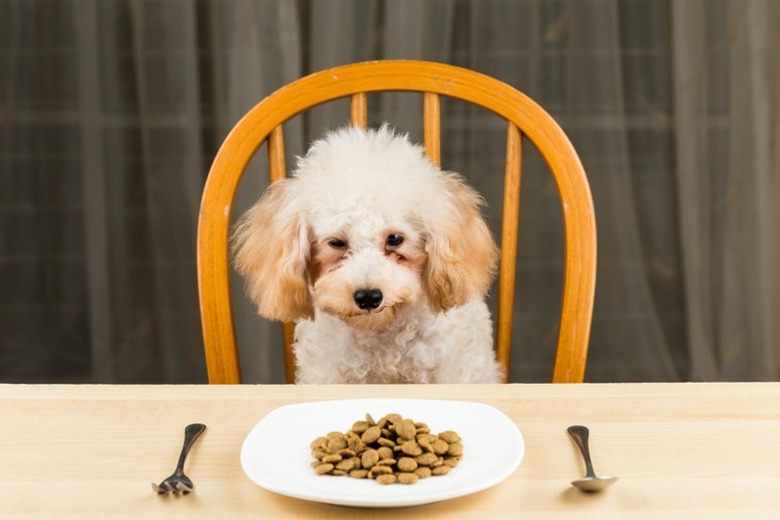What Type Of Food Do Most Dogs Prefer?
We may receive a commission on purchases made from links.
While feeding your pooch a balanced and nutritious food is your primary goal, it's a lost cause if your pup doesn't like the way it tastes and refuses to eat it. Your dog is a lot like you when it comes to food preferences. Smell, moisture level, textures and specific tastes all play a part in his dining satisfaction.
Dietary Evolution
Dietary evolution is one of the biggest factors that separates beloved canine companions from their wolf ancestors. This shift in dietary preferences led to and coincided with the domestication of wolves, ultimately making it easier for wolves and humans to live side by side. Over the years, the domestic dog's ability to break down certain carbohydrates has evolved into dietary preferences that more closely mimic what humans eat. Their taste buds, however, still prefer many of the tastes that wolves do. Dogs highly prefer meat over other types of food because of the smell, moisture and their taste buds.
Taste Buds
Like humans and other animals, dogs have specific taste buds dedicated to different taste factors in their food. The most numerous taste buds in the dog's mouth respond to certain amino acids, primarily L-proline and L-cysteine, which humans often describe as "sweet." Other taste buds respond to the sweetness of carrion or savory tastes. Unsurprisingly, one taste factor that dogs have a deep aversion to, which is fairly common among mammals, is bitterness.
Canned or Dry
As you probably well know, when given the opportunity to eat either canned or dry foods that primarily have the same ingredients, most dogs will take the canned. A few reasons lead to this preference: like their wolf ancestors, dogs tend to prefer their food moist and warm — like live kill. Canned food is often served at room temperature, and the moisture enhances the smell and taste of the food. Because of these particular preferences, you may find your pooch more thoroughly enjoys his kibble if you add some warm water to it and let it sit a little bit.
Unhealthy But Tasty
Dog food manufacturers are well aware of the importance of taste and smell to a pooch. Cheaper, lower-quality foods often contain a number of taste and smell enhancers to make the food more palatable to dogs. Because of this, your pooch might enjoy a low-quality but highly palatable food — just like human junk food — over a well-balanced, nutritionally complete formula. Always read the ingredients list on the dog food and choose a formula that has quality ingredients. Just because your pooch likes it doesn't mean you should feed it to her.
By Jasey Kelly
References:
Science: Diet Shaped Dog Domestication
The Journal of Nutrition: The Evolutionary Basis for the Feeding Behavior of Domestic Dogs (Canis familiaris) and Cats (Felis catus)
How Dogs Think: Understanding the Canine Mind; Stanley Coren
The National Academies: Your Dog's Nutritional Needs
About the Author
With a professional background in gardening, landscapes, pests and natural ecosystems, Jasey Kelly has been sharing her knowledge through writing since 2009 and has served as an expert writer in these fields. Kelly's background also includes childcare, and animal rescue and care.
